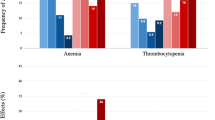Abstract
This study was undertaken to assess the previously unevaluated safety and feasibility of oxaliplatin-desensitization procedure add a French ambulatory cancer unit, which is a current topic in oncology. Our findings demonstrated that oxaliplatin-desensitization was safe and feasible in our ambulatory cancer unit. In routine practice, all these procedures are done on an inpatient basis starting at least the day before. Those results could change oncological practices in France and improve patients’ quality of life and lower costs associated with inpatient administration.
Similar content being viewed by others
Data Availability
The datasets used and/or analyzed during the current study are available from the corresponding author on reasonable request.
References
André T, Boni C, Mounedji-Boudiaf L, Navarro M, Tabernero J, Hickish T, Topham C, Zaninelli M, Clingan P, Bridgewater J, Tabah-Fisch I, de Gramont A (2004) Oxaliplatin, fluorouracil, and leucovorin as adjuvant treatment for colon cancer. N Engl J Med 350(23):2343–2351
Syrigou EI, Karapanagiotou EM, Alamara CV, Boura PG, Saif MW, Syrigos KN (2009) Hypersensitivity reactions to oxaliplatin: a retrospective study and the development of a desensitization protocol. Clin Colorectal Cancer 8(2):106–109
Brandi G, Pantaleo MA, Galli C, Falcone A, Antonuzzo A, Mordenti P, Di Marco MC, Biasco G (2003) Hypersensitivity reactions related to oxaliplatin (OHP). Br J Cancer 89(3):477–481
Hong DI, Dioun AF (2014) Indications, protocols, and outcomes of drug desensitizations for chemotherapy and monoclonal antibodies in adults and children. J Allergy Clin Immunol Pract 2(1):13–19 quiz 20
Castells MC, Tennant NM, Sloane DE, Hsu FI, Barrett NA, Hong DI, Laidlaw TM, Legere HJ, Nallamshetty SN, Palis RI, Rao JJ, Berlin ST, Campos SM, Matulonis UA (2008) Hypersensitivity reactions to chemotherapy: outcomes and safety of rapid desensitization in 413 cases. J Allergy Clin Immunol 122(3):574–580
Wong JT, Ling M, Patil S, Banerji A, Long A (2014) Oxaliplatin hypersensitivity: evaluation, implications of skin testing, and desensitization. J Allergy Clin Immunol Pract 2(1):40–45
National Cancer Institute Common Terminology Criteria for Adverse Events (CTCAE) Protocol Development (2010) | CTEP
Madrigal-Burgaleta R, Berges-Gimeno MP, Angel-Pereira D, Ferreiro-Monteagudo R, Guillen-Ponce C, Pueyo C, Gomez de Salazar E, Alvarez-Cuesta E (2013) Hypersensitivity and desensitization to antineoplastic agents: outcomes of 189 procedures with a new short protocol and novel diagnostic tools assessment. Allergy 68(7):853–861
Le Roy F, Rigault E, Regnault D, Hubert N, Burtin P, Hollebecque A, Malka D, Boige V, Ducreux M (2018) Oxaliplatin desensitization after hypersensitivity reaction: a single-center experience on more than 300 procedures. J Clin Oncol 36(4_suppl):610–610
Acknowledgments
We acknowledge Janet Jacobson, an English-speaking American scientist, for her review of our clinical report.
Author information
Authors and Affiliations
Corresponding author
Ethics declarations
Research involving human participants and/or animals
For this type of study format consent is not required.
Informed consent
For this type of study format consent is not required.
Conflict of interest
Damien Botsen reports personal fees from Pierre Fabre and non-financial support from GlaxoSmithKline, Novartis, Chugai, and Amgen outside the submitted work.
Camille Mazza reports personal fees from Pierre Fabre outside the submitted work.
Mathilde Brasseur reports personal fees from Bayer and non-financial support from Pierre Fabre, Novartis, Amgen, Roche, and AbbVie outside the submitted work.
Olivier Bouche reports grants from Roche, personal fees from Roche, grants from Pierre Fabre, personal fees from Pierre Fabre, personal fees from Amgen, personal fees from Bayer, personal fees from Lilly, personal fees from Merck, personal fees from Novartis, outside the submitted work.
Elise Lepoix, Florian Slimano, and Anne Grange: none.
Additional information
Publisher’s note
Springer Nature remains neutral with regard to jurisdictional claims in published maps and institutional affiliations.
Rights and permissions
About this article
Cite this article
Botsen, D., Lepoix, E., Mazza, C. et al. Oxaliplatin-desensitization procedure is safe and feasible in an outpatient cancer unit in France. Support Care Cancer 27, 3179–3182 (2019). https://doi.org/10.1007/s00520-019-04863-5
Received:
Accepted:
Published:
Issue Date:
DOI: https://doi.org/10.1007/s00520-019-04863-5




